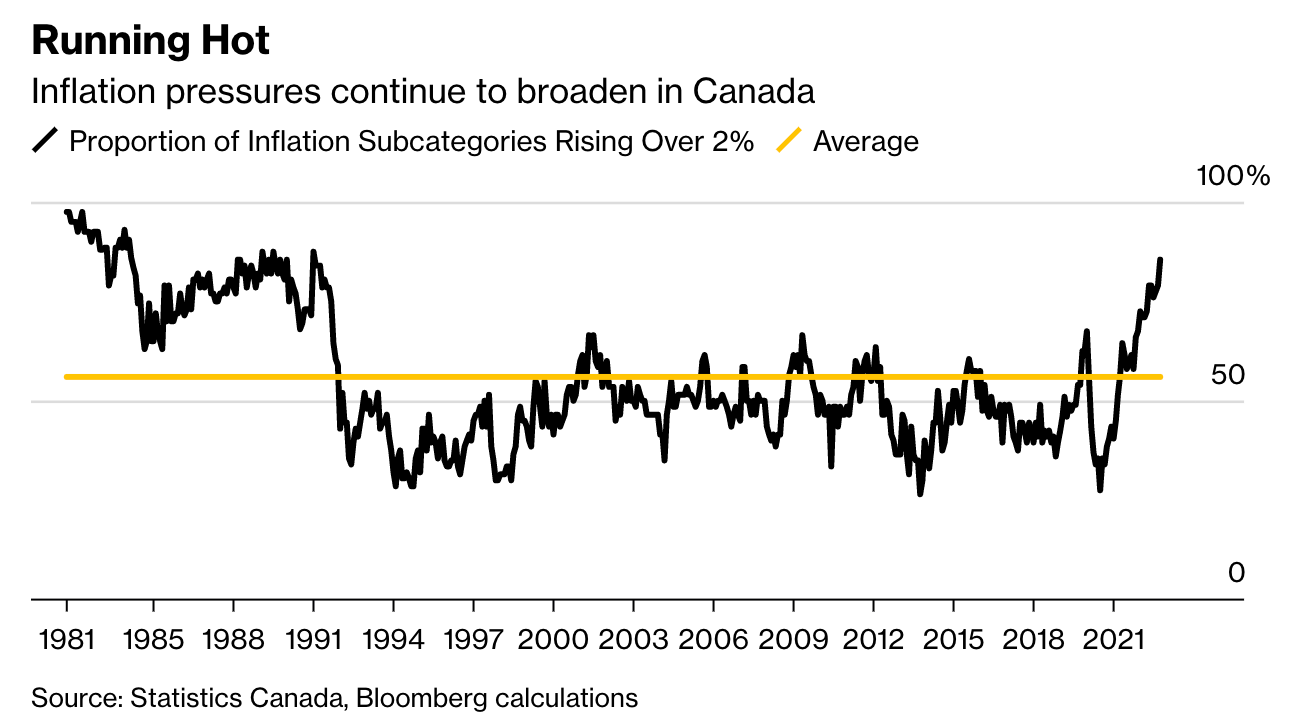Happy Monday Morning!
No bottom yet. Data published by CREA last week showed national house prices slid lower in the month of October, dropping 1.2% month-over-month. The national home price index is now down 15% since peaking in March earlier this year, the steepest correction on record since the index was created in 2005. Just for comparison sake, the previous record was a 9% peak to trough decline in 2008-09.
The index measures the price of a “typical home” in Canada. In other words, the typical home across Canada has declined by $132,900 this year. Of course all Real Estate markets are hyper-local, and the declines are not spread out evenly. However, other than Calgary, most major metros are enduring a real correction.
We should not underestimate the ramifications of a 15% price correction to the national home price index. Real Estate transactions and mortgage volumes have been slashed nearly in half. It is survival of the fittest now. The industry is going to go through a significant restructuring after a blistering hot bull market sowed the seeds of its own demise. Two things got my attention this week:
Properly, a tech startup/ real estate brokerage has announced significant job cuts. One has to imagine their model of guaranteeing a firm sale of their clients home is not going so well in one of the worst bear markets in several decades.
Redfin, a massive discount US Real Estate brokerage is quietly exiting the Canadian market after several years.
Hundreds of millions of dollars have been eviscerated over the past six months, just what the doctor ordered over at the Bank of Canada. And while headline inflation is coming down, it’s coming down too slowly for the BoC. Annual price gains stalled at 6.9% in October, better than many economists were expecting and down from a peak of 8.1% in June, but over 85% of 62 subcategories tracked in the consumer price index are still rising by more than the Bank of Canada’s 2% inflation target. That’s the highest proportion since 1991.
Which ultimately means rates will remain elevated for at least awhile longer, draining more disposable income towards debt service payments. According to Desjardins, nearly every borrower who took out a fixed payment variable mortgage between May 2020 and July 2022 now owes more in interest than their monthly fixed payment.
These are the trigger rates everyone keeps talking about. Painful. Consumer spending is going to nosedive this holiday season. Not only is your average home down $132,900 but your interest payments are through the roof. The house ATM doesn’t work like it used to.
However, just as the bull market sowed the seeds of its own demise, this bear market will do the same. New housing starts are in the process of taking a dirt nap, at a time when immigration targets are being ramped up.
Or another way to look at it, Canada has 3.5 new people for every new home, and the US has 0.6 new people per home.
Short term pain, long term gain if you can make it through the other side.






The house prices will fall a lot more to get back to pre Covid and pre stimulation values. Imagine how many will be in the bucket with their purchases during bidding wars. Will be tragic for many people and families. Real inflation is much higher than reported by stats canada. Interest rates will no doubt rise more although the rates will be well below inflation. In short , rates have to rise much higher to combat inflation. Check history and Volker circu 1980. Research. Taylor Rule. Problem is BofC cannot raise rates too much higher as the cost to the government debt would be astronomical. Think of all the government treasuries bought by central bank at low interest rates. Those bonds with current interest rates are worthless.